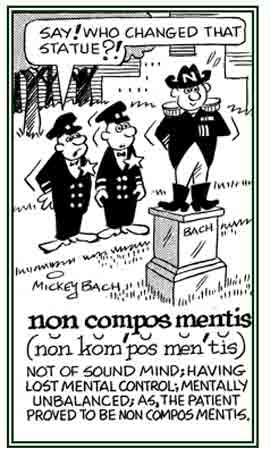Latin Proverbs, Mottoes, Phrases, and Words: Group N
(classical-language maxims, slogans, adages, proverbs, and words of wisdom that can still capture our modern imagination)
Expressions of general truths: Latin to English maxims, proverbs, and mottoes
Word entries are from Latin unless otherwise indicated.
Said to be from Julius Phaedous c. 15 B.C. - A.D. 45 (born in Thrace and lived as a freedman in Rome and wrote fables which are considered by some to be superior to Aesop's).
This proverb is engraved in stone above the fireplace at the Grove Park Inn in Asheville, North Carolina; as confirmed in an e-mail message from Grove Park Inn, dated 10 June 2002.
The quotation is also interpreted to mean: "If what we do is not useful, it is stupid to boast about it."
A medical term used in prescriptions.
Literally, "being unwilling, willing". This refers to anyone who does something he/she really does not want to do, but does it nolens, volens. Sometimes the phrase is used to mean "willy-nilly" or "hap-hazardly".
Another translation version is, "I do not want to contend." A plea entered in law by the defendant that subjects the person to a judgment of conviction; by so doing the defendant does not necessarily admit guilt, but also declares that he/she will not offer any defence. The defendant may then be declared guilty, yet retain the right to deny the validity of that finding in related proceedings.
When a defendant pleads nolo contendere, he/she neither admits guilt nor proclaims innocence and so avoids negative publicity that would occur in an actual trial.
A reference to graffiti, as in
Are always found in public places.
Motto of the former African country of Rhodesia.
The legal term for a plea denying a promise or undertaking.
This expression is about double jeopardy in the courts. It could also be a child's defense against further punishment by his/her father after being punished by her/his mother.
Said of a lunatic, idiot, drunkard, or one who has lost his or her memory and understanding by accident or as a result of a disease.
Non compos mentis is the legal expression used for any form of mental unsoundness. See compos mentis for the opposite condition.


Go to this Word A Day Revisited Index
so you can see more of Mickey Bach's cartoons.
A legal verdict exonerating a person who has been on trial.
Also translated as, "That was inappropriate."
These are the words that the sheriff writes on a writ when the defendant is not to be found in his bailiwick (area of legal responsibility).
![]() Units of mottoes and proverbs listed by groups: A to X.
Units of mottoes and proverbs listed by groups: A to X.


